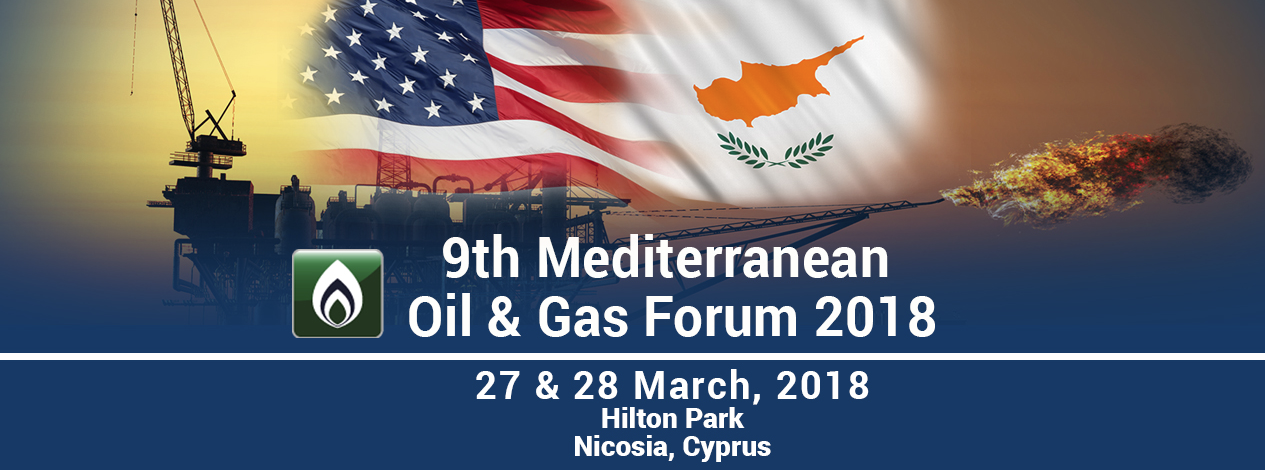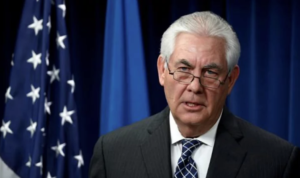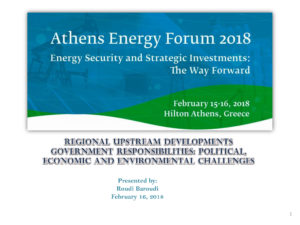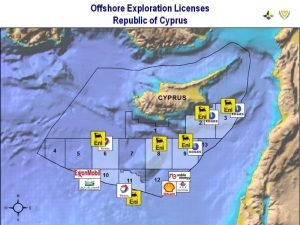AGENDA
THURSDAY | February 15
11.30 Participants Arrival – Registration
12.00 WELCOME REMARKS: Achilles Tsaltas, Vice President, International Conferences, The New York Times
12.10 OPENING SPEECH: George Stathakis, Minister of Energy and Environment, Hellenic Republic
12.30 REMARKS: Konstantinos Skrekas, MP – New Democracy Party, Head of Energy and Environment Sector,
- Minister of Development and Competitiveness, Hellenic Republic
12.40 REMARKS: Prof. Yannis Maniatis, MP, Democratic Coalition, f. Minister of Environment, Energy & Climate Change
Introduction & Chair: Symeon Tsomokos, Founder & Chairman, Delphi Economic Forum
12.50 Panel 1: The Global Geopolitical Parameters
- Diversification of energy sources to bring about energy independence for the region
- The impact of Brexit on EU Security & Energy Policy
Kate Smith, British Ambassador to the Hellenic Republic
Steven Bitner, Economic Counselor, U.S. Embassy, Athens
Energy sector as a leveraging tool despite geopolitical challenges
Nabil Fahmy, Dean, School of Global Affairs & Public Policy, American University of Cairo, f. Minister of Foreign Affairs, Egypt
Defne Sadiklar-Arslan, Executive Director, Atlantic Council Turkey
Introduction & Chair: Athanasios Ellis, Editor in Chief, Kathimerini English Edition
13.45 Networking Break – Light Lunch
14.30 Panel 2: Strategic Privatization Opportunities in the Energy Sector
Laurent-Charles Thery, Director for International Development, GRTgaz
George Longos, Managing Partner, Alantra
Introduction & Chair: Achilleas Topas, Journalist, SKAI Media Group Co-hosted by
14.50 Panel 3: Completing the Midstream Puzzle: Exporting Gas from the Eastern Med and the Caspian Sea
- Progress report on IGB and the dynamics of a second LNG imports facility in Alexandroupolis
- TAP: Progress Report and Phase 2
- The feasibility of the East Med Gas Pipeline
- The LNG export option
The View from Greece
Dimitrios-Evangelos Tzortzis, CEO, Public Gas Corporation – DEPA, Greece
Sotiris Nikas, President & CEO, Hellenic Gas Transmission System Operator – DESFA, Greece
Panayotis Kanellopoulos, Managing Director, M&M Gas S.A., Greece
The View from the Region
Ron Adam, Ambassador, Special Envoy on Energy, OECD coordinator, Ministry of Foreign Affairs, Israel
Katerina Papalexandri, Country Manager Greece, TAP
Albert Nahas, Vice President, International Affairs, Tellurian Inc., U.S.A.
Dr. Theodore Tsakiris, Assistant Professor, Geopolitics & Hydrocarbons, University of Nicosia, Cyprus & Scientific Adviser Athens Energy Forum
Introduction & Chair: Alex Lagakos, Founding Chairman, Greek Energy Forum| Member, Sustainable Energy Committee
United Nations Economic Commission for Europe
16.00 Networking Break
16.30 Panel 4: The Domestic and Regional Electricity Market Dynamics
ADMIE: The day after the ownership unbundling
Manousos Manousakis, Chairman and CEO, Transmission System Planning Department, IPTO S.A., Greece
- The continuous need for complete market liberalization
- Progress report on the Inter-connectivity between the Islands and Mainland Greece
Prof. Nikos Chatziargyriou, Chairman & CEO, Hellenic Electricity Distribution Network Operator S.A.- HEDNO, Greece
Stavros Goutsos, Deputy CEO, Public Power Corporation, Greece
Dinos Benroubi, General Manager Electric Power Business Unit, MYTILINEOS, Greece
Introduction & Chair: Dr. Athanassios S. Dagoumas, Assistant Professor in Energy and Resource Economics, University of Piraeus
17.15 End of the 1st Day of the Forum Co-hosted by
FRIDAY | February 16
09.30 Arrival of Delegates – Coffee/Tea
10.00 KEYNOTE SPEECH: Dr. Stelios Himonas, Permanent Secretary, Ministry of Energy, Commerce, Industry and Tourism, Cyprus
10.15 Panel 5: Regional Upstream Developments: Political, Regulatory and Economic Challenges
- The results of Cyprus’ Third Licensing Round and the Onisiphoros Discovery
- Future exploration prospects in Egypt and Israel and Lebanon’s untapped potential
- The entry of Exxon and Total in the Greek Upstream market
- Lebanon – The award of 2 offshore Blocks to TOTAL / ENI / Novatek
The national perspective
Yannis Bassias, President & CEO, Hellenic Hydrocarbons Resources Management S.A., Greece
Yannis Grigoriou, General Manager Exploration & Production of Hydrocarbons, Hellenic Petroleum SA
The regional perspective
Dr. Constantinos Hadjistassou, Ass. Professor, School of Sciences & Engineering, University of Nicosia
Bernard Clement, Vice President for Caspian and Southern Europe, Total E&P, France
Roudi Baroudi, CEO, Energy & Environment Holding, Qatar
Introduction & Chair: Dr. Theodore Tsakiris, Assistant Professor, Geopolitics & Hydrocarbons, University of Nicosia, Cyprus &
Scientific Adviser Athens Energy Forum
11.15 Networking Break
11.45 Panel 6: Sustainable development – climate change and energy
- Making energy technologies cleaner
- Responsible steps to cut carbon pollution
- Winning the global race for clean energy innovation
The evolving policy framework
Dr. Dionysia Avgerinopoulou, f. Chairman of the Standing Committee for the Environment of the Hellenic Parliament
Konstantinos Xifaras, Secretary General, World Energy Council, Hellenic National Committee
A focus on cleaner and alternative fuels
Dr. Spyros Kiartzis, Manager New Technologies & Alternative Energy Sources, Hellenic Petroleum S.A.
Dionissis Christodoulopoulos, Managing Director, MAN Diesel & Turbo Hellas Ltd, Greece
Introduction & Chair: Zoi Vrontisi, Chairwoman, National Center for the Environment & Sustainable Development Co-hosted by
12.30 Panel 7: RES, Energy Efficiency and Technological Innovation
- RES as a means of energy security
- Energy efficiency technologies as a new area for growth
- Overcoming regulatory hurdles for RES development
Harris Damaskos, Associate, EBRD
Professor Xenophon E. Verykios, Managing Director, Helbio Hydrogen & Energy Systems, Greece
Zisimos Daniil Mantas, Chief Business Development Officer, Eunice Energy Group, Greece
Introduction & Chair: Miltos Aslanoglou, Energy Regulation Expert, Greece
13.00 End of Forum












